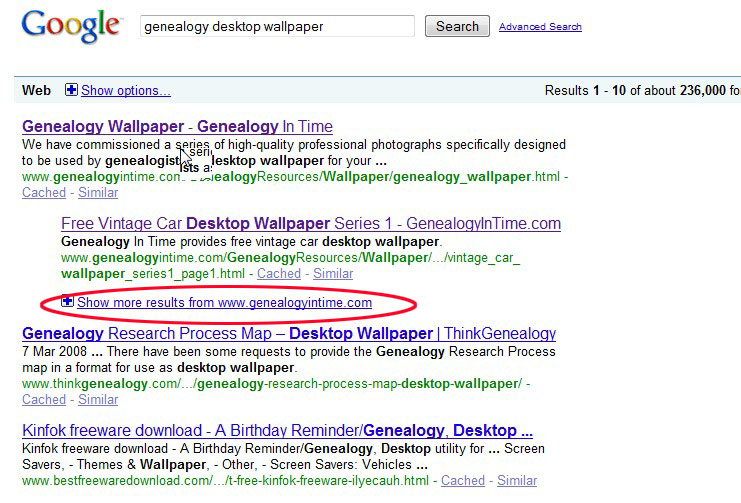Genealogy This Week - 5 September 2009
Our weekly compilation of interesting new tools, resources and stories for genealogists:
Google QuickLinks - Google has just started to show a new 'quicklink' in their search result listings. By clicking on the link (see the example below), the search results will expand and show more listings from a particular site. This could be very useful for any genealogist wanting to search further through a particular website.

More information on Google genealogy searches are available in the articles Hot Tips on How to Use Google for Genealogy Searches and How to Refine Google Genealogy Searches.
Software that Can Read Ancient Handwriting - A company in Israel is claiming to have developed software that can read old handwriting. This has potentially huge implications for genealogy. The biggest impediment to putting online old census and other genealogy records is that the records must be transcribed by a human because currently there is no software that can read old handwriting. Doing everything by hand is a slow and expensive process. Thus, if this software works as advertised, it could seriously speed up by several orders of magnitude the process of getting old genealogy records online. The work, however, is still in the research stage and it will probably take a couple of years to commercialize. [Link]
First Names Do Run in Families - Ancestry.com has put out a neat press release detailing how first and second names run in families. For example, 33% of Americans were named after their father, 17% after their grandfather and 15% after their grandmother. The press release is full of interesting and useful statistics about how names run in families. [Link]
The Internet Celebrates 40 Years - The internet turns 40 this week. Although the internet did not receive widespread public use until 1994, it has been around much longer than most people realize. Originally designed as a US military application (a distributed computer network that could survive a nuclear war), it was later picked up by universities wanting to collaborate on research. It was only in the mid-1990s that the public started to take a serious interest in the internet. To celebrate the 40th anniversary of the internet, we found an interesting article that shows how 20 popular websites looked when they were first launched. Check out how Yahoo looked in 1994 and Google looked in 1995. [Link]
Keeping Your Friends Too Close - One interesting aspect of social networking sites such as Facebook is that people can perhaps become too involved in their friends' lives. Two recent articles in the mainstream press examine this issue from various perspectives. The first article from the Wall Street Journal discusses how too much interaction with friends on Facebook can ruin relationships. The second article from the New York Times discusses how some people become overwhelmed from using Facebook and decide to leave. [Link for WSJ] [Link for NYT]

